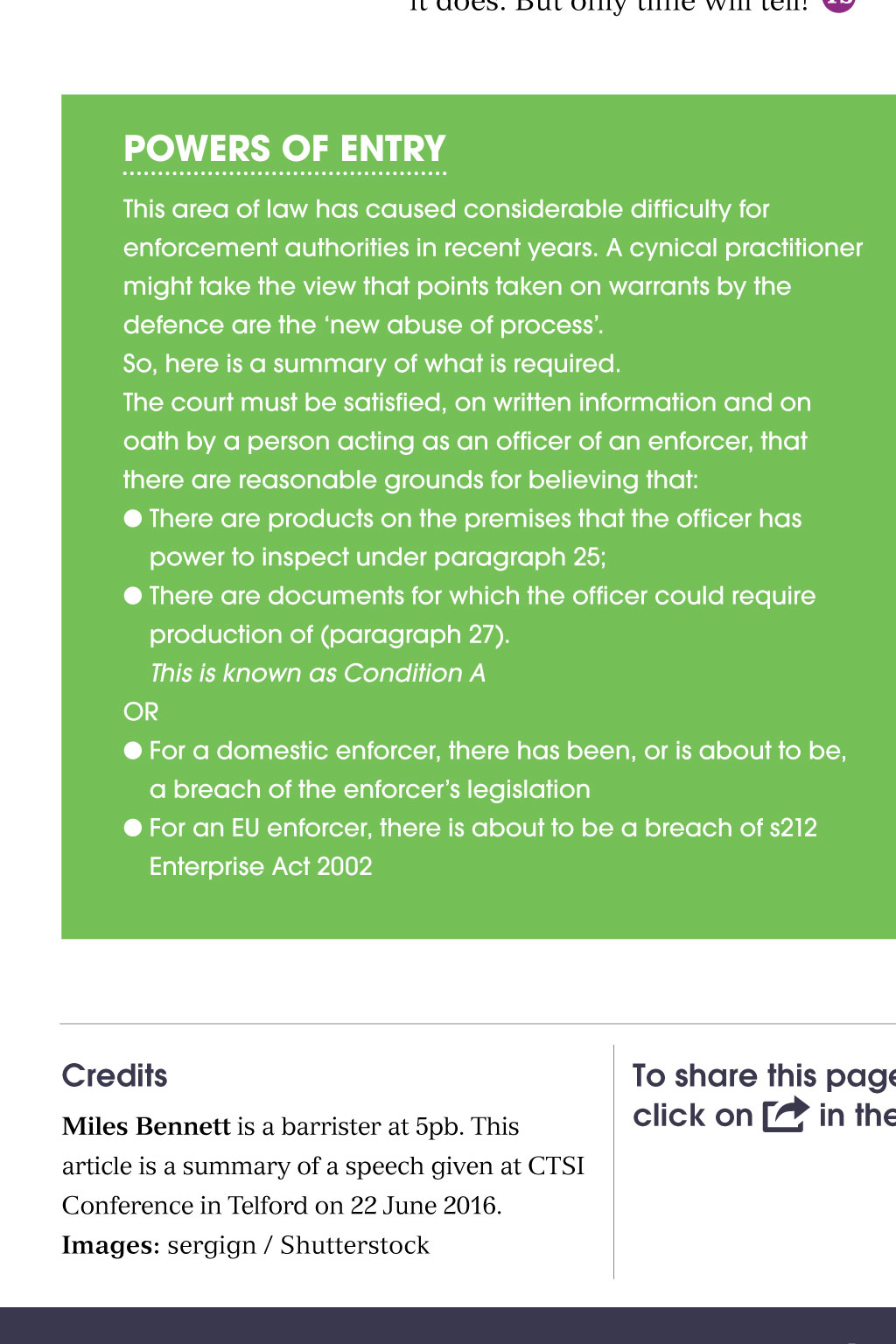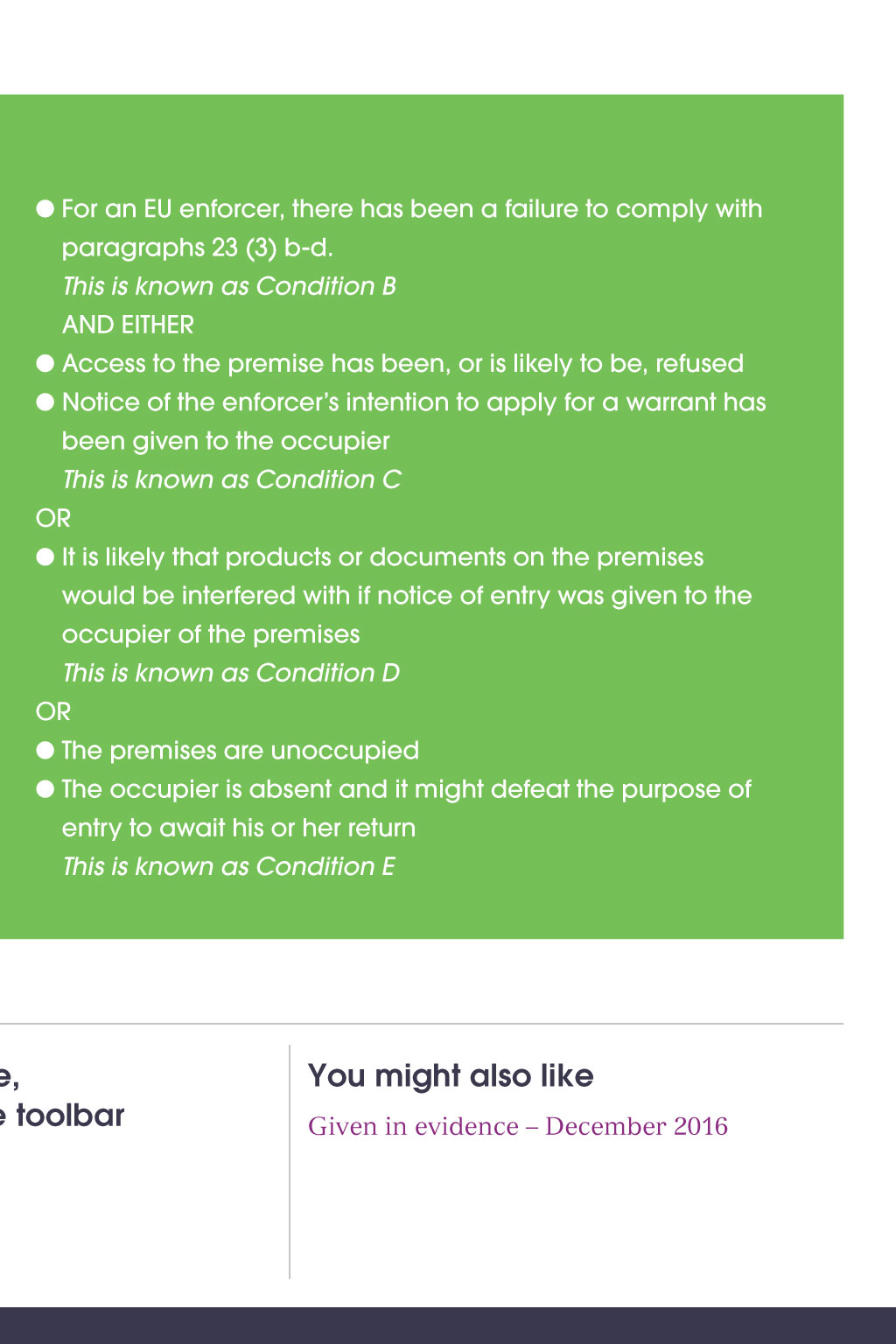






























Legal perspectives: investigatory powers & Consumer Rights Act 2015 In this feature l enforcers legislation l notices l powers of entry A brief, practical guide by Miles Bennett to using investigatory powers under the Consumer Rights Act 2015 Scheduling power T here cant be many Acts of Parliament in which something as important as investigators powers are in a schedule. These powers are contained and referred to in Section 77 (Part 3 Miscellaneous and General) and Schedule 5 of the Consumer Rights Act 2015. The aim was to consolidate, into one act, enforcement powers for investigators dealing with the Consumer Rights Act 2015, including trading standards officers. Part 2: Enforcers legislation Paragraphs 9 to 11 of Schedule 5 are a) new and b) important. Paragraphs 10 and 11 set out the legislation to which enforcers powers relate. They are prescriptive. If the legislation is not on the list, then powers do not apply. It is difficult to know whether parliament thought it was widening the scope of enforcement powers or intending to restrict them. If it thought it was achieving the former, it failed. In many investigations by the Competition and Markets Authority or local government departments, for instance, the issue of dishonesty and fraud may be present. The Fraud Act 2006 is not mentioned in either paragraph 10 or 11. Although there is power to add to paragraphs 10 and 11, it seems a strange (or deliberate) omission by parliament. It is unclear whether parliament was being particularly devilish, or hadnt considered this potentially dramatic route for enforcers to water down or get round the right against selfincrimination Part 3: Powers in relation to the production of information The powers are set out in paragraphs 13 to 18 of Schedule 5. Who can rely on them and when will depend on what type of enforcer you are and what power you are seeking to enforce. An example: a local weights and measures authority is a domestic enforcer (see paragraph 3), and it is also an EU enforcer (see paragraph 4). Yet the powers to require the production of information will vary depending on a) in what capacity the investigator is acting and b) which legislation they are seeking to enforce. Notices These need to set out what information is required and the purpose of requiring it. There are exceptions and safeguards. The person is not required to produce documents that would be subject to legal professional privilege (LPP) in the high court (see paragraph 15, (6) and(7)). In addition, if a trader has complied with a notice under paragraph 14, the information is not admissible in criminal proceedings but, this is where it gets interesting. The notice can be aimed at a person, not just the trader although the former may well include the latter. Paragraph 17 (3) prohibits the use of the information provided and any question being asked about the information in any proceedings against that person. So, if you serve a notice on Bennett plc, you cannot use that information as part of your case against Bennett plc unless Bennett plc chooses to use the information in those proceedings themselves. But what if you serve the notice on Dale Jones, who just happens to be a director/company secretary of Bennett plc? If Jones refuses to comply, the enforcer can go to the county or high court to get an order, forcing the production of the information, and Jones is probably committing an offence of obstruction (see Part 5, paragraph 36). If the notice is against the company secretary, is the information admissible against the plc? It is unclear whether parliament was being particularly devilish, or hadnt considered this potentially dramatic route for enforcers to water down or get round the right against self-incrimination. Part 4: Further powers exercisable by domestic enforcers and EU enforcers Paragraphs 19 and 20 make it clear that domestic and European enforcers are only able to exercise their powers under Part 4 if one of the conditions set out is met. Practitioners would be well advised to be aware of these paragraphs because they set out prescriptive pre-conditions. This list is exhaustive. You need to look at the power mentioned, and then why the enforcer can exercise it. Paragraph 23 sets out a number of conditions. The term used wholly or mainly as a dwelling is a departure from previous premises descriptions. This paragraph now requires that notice be given in writing, setting out what is required, with at least two working days notice (see paragraph 23 (4) a-c)). Once on the premises, the officer can exercise the powers outlined in paragraphs 25 to 31. At paragraph 27, it is important to note that there is a power to require the production of documents from a trader, or a person on the premises acting on behalf of such a trader. The trader cannot refuse on the grounds that the document might incriminate them (or indeed, anybody else). The only basis for refusal is limited liability partnership. Parliament has made a distinction between requests for information versus powers to require production while actually on the premises AND requiring someone to give an explanation of the documents. The use of the term someone is deliberate. It doesnt have to be (i) the trader, (ii) a trader or (iii) someone acting on behalf of a trader although, in reality, it is likely that the someone will fall into one of (i)-(iii). Arefusal to explain may well leave that someone open to prosecution for obstruction (paragraph 36). There is a clear omission, when compared with paragraph 15, of the right against self-incrimination. It is difficult to know whether parliament thought it was widening the scope of enforcement powers or intending to restrict them. If parliament thought it was achieving the former, it failed Part 6: Exercise of enforcement functions by area enforcers Practitioners would be well advised to be aware of these paragraphs because they set out prescriptive pre-conditions. This list is exhaustive Paragraphs 44 to 46 appear, to some of us, to be long overdue. Local government and trading standards departments powers to prosecute criminal proceedings came (in part) from Section 222 of the Local Government Act 1972. This allowed local authorities to prosecute any proceedings if they considered it expedient for the promotion or protection of the interests of the inhabitants of their area. There have been a number of conflicting decisions in the divisional/administrative court when dealing with decisions by a local authority to prosecute for offences outside their geographical boundaries. Section 222 has not been repealed, but now you needntworry. Providing you can show that you were investigating an offence under legislation listed in paragraph 10 of Schedule 5, you may now bring criminal proceedings as an enforcer (as defined) for offences outside your area not only for offences contrary to legislation listed in paragraphs 10 and 11, but also for an [any] offence originating from an investigation into a breach of legislation listed in paragraph 10. Paragraph 46 (2) reads: (2) In sub-paragraph (1) a consumer offence means (a) An offence under legislation which, by virtue of a provision listedinparagraph 10 of this Schedule, a local weights and measuresauthority in England or Wales has a duty or power toenforce (b) An offence under which legislation within paragraph (a) is made (c) An offence under legislation listed in the second column of the table in paragraph11of this Schedule, in relation to which a local weights and measures authority is listed in the corresponding entry in the first column of the table as an enforcer (d) An offence originating from an investigation into a breach of legislation mentioned in paragraph (a), (b) or (c) Does that include offences under the Fraud Act? Our view at 5pb is that it does. But only time will tell! PoWERS oF ENtRY This area of law has caused considerable difficulty for l For an EU enforcer, there has been a failure to comply with enforcement authorities in recent years. A cynical practitioner paragraphs 23 (3) b-d. might take the view that points taken on warrants by the This is known as Condition B defence are the new abuse of process. AND EITHER So, here is a summary of what is required. l Access to the premise has been, or is likely to be, refused The court must be satisfied, on written information and on l Notice of the enforcers intention to apply for a warrant has oath by a person acting as an officer of an enforcer, that been given to the occupier there are reasonable grounds for believing that: This is known as Condition C l There are products on the premises that the officer has OR l It is likely that products or documents on the premises power to inspect under paragraph 25; l There are documents for which the officer could require would be interfered with if notice of entry was given to the production of (paragraph 27). occupier of the premises This is known as Condition A This is known as Condition D OR OR l For a domestic enforcer, there has been, or is about to be, l The premises are unoccupied l The occupier is absent and it might defeat the purpose of a breach of the enforcers legislation l For an EU enforcer, there is about to be a breach of s212 Enterprise Act 2002 Credits Miles Bennett is a barrister at 5pb. This article is a summary of a speech given at CTSI Conference in Telford on 22 June 2016. Images: sergign / Shutterstock entry to await his or her return This is known as Condition E To share this page, in the toolbar click on You might also like Given in evidence December 2016